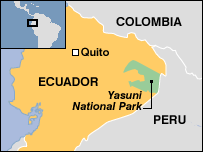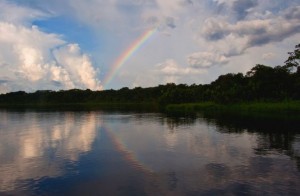Drilling to the End of the Earth: The Rights of Future Generations
Oct 15th, 2013 | By admin | Category: Environment/SustainabilityBy Suzanne York, www.howmany.org
The government of Ecuador, after failing to convince wealthy, industrialized countries to pay to leave oil in the ground, has now reversed course and approved drilling in Yasuní National Park, located in the Amazon rainforest.
The revolutionary plan was originally hailed in 2007 as a potential model for a more sustainable/less fossil-fuel intensive future. Environmentalists believed Ecuadorian President Rafael Correa was setting a precedent in the fight against climate change and environmental degradation by empowering developing nations to protect natural areas.
Insufficient Funds
Unfortunately, the developed world didn’t come through, and pledges only reached $13.3 million. The initiative’s goal, known as the Yasuni-ITT Initiative, was to not drill for hundreds of millions of barrels of oil in the Ishpingo, Tambococha and Tiputini oil fields under Yasuní National Park in return for compensation of at least half the unearned revenues, estimated at $3.6 billion.
Yasuní is one of the most biodiverse rainforests on the planet, and home to two isolated indigenous groups.
Thousands of Ecuadorians are protesting President Correa’s decision to drill, prompting the government to crackdown on the protestors. According to Amazon Watch, which has been following the Yasuní case closely,” if drilling were to move forward it would be a disaster for the rainforest and indigenous rights, and it would pave the way for drilling in 6.5 million acres of indigenous territory in the southern Ecuadorian Amazon.”
Calls for a national referendum on the government’s plans to drill in Yasuní are growing and an international petition to save Yasuní is being circulated online.
Yet regardless of the referendum’s success, the bigger question is the failure of world governments and global society to understand what could be gained by not drilling and burning up even more fossil fuels. Certainly some get it, but what is really at stake here – beyond the crucial issues of carbon emissions, indigenous rights and environmental degradation – are the rights of future generations.
Play Now, Pay Later Mentality
Too many people live as if their actions have no consequences, be it today or tomorrow. We push endless economic growth, consume more and more, and have a global population of over 7 billion people, likely to hit over 9 billion by 2050.
At the International Women’s Earth and Climate Summit, a gathering of women environmental leaders last month in New York, primatologist Jane Goodall didn’t shy away from tough issues, telling the audience that “we have to talk about the ever-growing numbers of people on the planet” in a world of finite resources. In her quiet demeanor, she talked about the need to empower women, instill hope in today’s youth, and create empathy; she also mentioned the rights of future generations.
A new narrative needs to be “written” about the world we are leaving behind for tomorrow’s children and injected into policies, initiatives, and general discourse. The concept of inter-generational responsibility has to be incorporated into the national discourse in all countries. Many scientists believe the Earth is undergoing its sixth mass extinction. What are the consequences of this, for people and for nature?
Creating a better world won’t be done by politicians (just look at the ineptitude of the majority of the U.S. Congress). There are countless other potential Yasuní examples around the world – in both developing and developed nations.
Today more than ever, every citizen on the planet has the responsibility to leave a better world behind – for the sake of the next generation, and the planet itself.
Suzanne York is a senior writer with the Institute for Population Studies.


